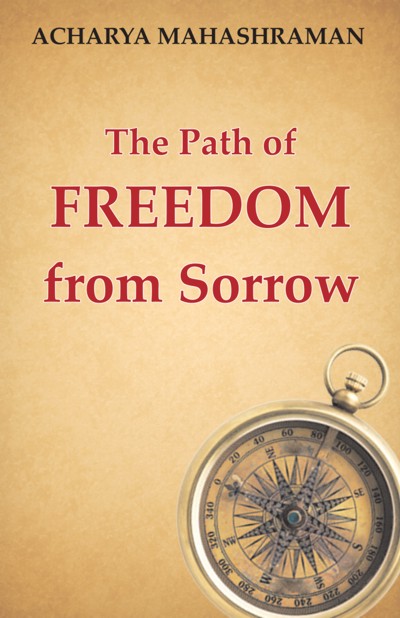Man is a thoughtful being. He has the potentiality to formulate his goals by using his intelligence and conscience. He moves forward in the direction of his goal. The thing to be analysed is, 'What kind of goal one has set? Is the goal right or wrong? Was the perspective true or false? Before the goal is formulated, it is essential to know whether the perspective of forming the goal is right or not. As the famous saying goes -'World to you is what you perceive it as.' The structure of the goal is determined by the quality (right or wrong) of the perspective.
According to Jain Philosophy there are nine real elements, of which ashrav is the fifth one. There are five types of ashrav and the first is mithyatv (wrong perspective). It plays an important role in bringing misfortune. The perverted perspective means there is a fault in the foundation. How can we imagine a stability of a multi-story building with a weak foundation? From spiritual perspective it remains a burning question that where the perspective of a person actually revolves around? Is it the external world or inner world? A man with materialistic perspective finds the shelter in wealth, comforts, and worldly relations whereas a spirituality-oriented man keeps his soul at nucleus and the matter at the circumference level.
Today man is strongly attracted towards material objects, because these objects have external dazzle and temptation. As a result, extrovert consciousness automatically gets pulled towards the external world and the attraction for soul goes away from him. As soon as the path of perspective gets clean and clearer, he gets to know the true knowledge. He turns away from the material world and steps forward towards the true self.
Once there lived a highly influential king. He was endowed with intelligence and wealth as well. Neighbourhood kings often used to look for advice from him when needed.
One night the king was lying down on his bed and he went into deep thinking about his royal life. He started feeling pride for his royal glory and luxury. He thought how lucky and fortunate I am! How extensive my family is! How prosperous is my kingdom! How capacious is my army! How perpetual is my royal treasure! Such is rare to find anywhere else. Even the prosperity of Kuber (the God of treasures) is small compared to my treasure. The angels of the heaven might be getting jealous by looking at the glory of my queen's palace. My each word is a command and everyone respects it. In this way the air of arrogance was blowing up all around the king's body and mind.
King was a great scholar of Sanskrit and he was very fond of composing couplets in Sanskrit. Since, imagination makes the composition easy, the king started to thread his stimulated thoughts through the web of words. Three lines were already composed and the fourth line was remaining. It's true that until the entire verse is created the composer keeps tapping the composed lines on his tongue. So the king was humming these three lines over and over.
Chetohara yuvatayah swajananukulah Sadbandhavah
pranayagarbhagirascha bhrityah Garjanti
dantinivahastaralasturangah...
The meaning of three lines is - 'I have charming queens, favourable family members, the best extended family members, humble and obedient attendants, a huge army with elephants, and horses...'
He was not able to form the fourth line even after humming several times. Incidentally, the same night one thief entered the palace for theft and he stepped into the bed room of the king and cringing himself sat under the bed. The thief was also a scholar of Sanskrit language and was master of impromptu poetry. He was expert in spontaneous composing of verses on given topic and words.
The thief heard the three lines of the verse hummed by king. He understood that the king was not getting the fourth line. He forgot that he is a thief and after repetition of three lines by the king, he hummed the fourth line sammilane nayanyornahi kinchidasti
i.e. kingdom, glory etc. are meaningful only till eyes are open. After permanent closing of eyes nothing matters. In other words, when you become the guest of God of Death, nothing will be left for you in this world. Therefore, why are you feeling proud?
Just one line voiced by the thief was an eye opener for the king and he got the right perspective. Then surprisingly he started looking around and thought, 'Who has said such a knowledgeable thing? How did he say? Then he called upon, 'whosoever is under my bed, come out before me.' The thief came out. Politely he said, 'O king! I came here for stealing. But after listening to the composition hummed by you, I forgot that I am a thief. My love for Sanskrit got stimulated. Consequently, I dared to complete the fourth line of the verse. O lord! I am a culprit. You are great. Please forgive me.' The opportunist king replied, At this moment I have no business with your personal life. Now you are my guru. You have given me a right perspective. You have introduced me to the truth. Nothing is left after closing the eyes- by saying this statement you have made me realize the truth. Therefore, you have become my guru. Being my guru, you can ask for anything from me.' The thief could not understand such behaviour of the king. Then king continued, 'Today my eyes of wisdom got opened. I am acquainted with the reality. Therefore, to follow the saying -'shubhasyshighram' (good deed should be done soon), I want to become monk as soon as possible. Now the kingdom seems like a pallet to me. I have lost all my attraction for it. If you want my kingdom, I can give you happily.
The thief replied - 'O king! As you got lesson from one sentence, my consciousness also got awakened. How can I enjoy after knowing that kingdom you are leaving is meaningless? I too want to become monk with you, very soon the king and thief both became monks. Both heads got vibrated just by one sentence. This is the outcome of right perspective. Until the perspective of king was right, his wealth, glory, and luxuries were everything for him. As soon as the coloured glasses were taken off of the eyes, the perspective became true, and the perception regarding the matter and consciousness got discriminated.
 Acharya Mahashraman
Acharya Mahashraman
